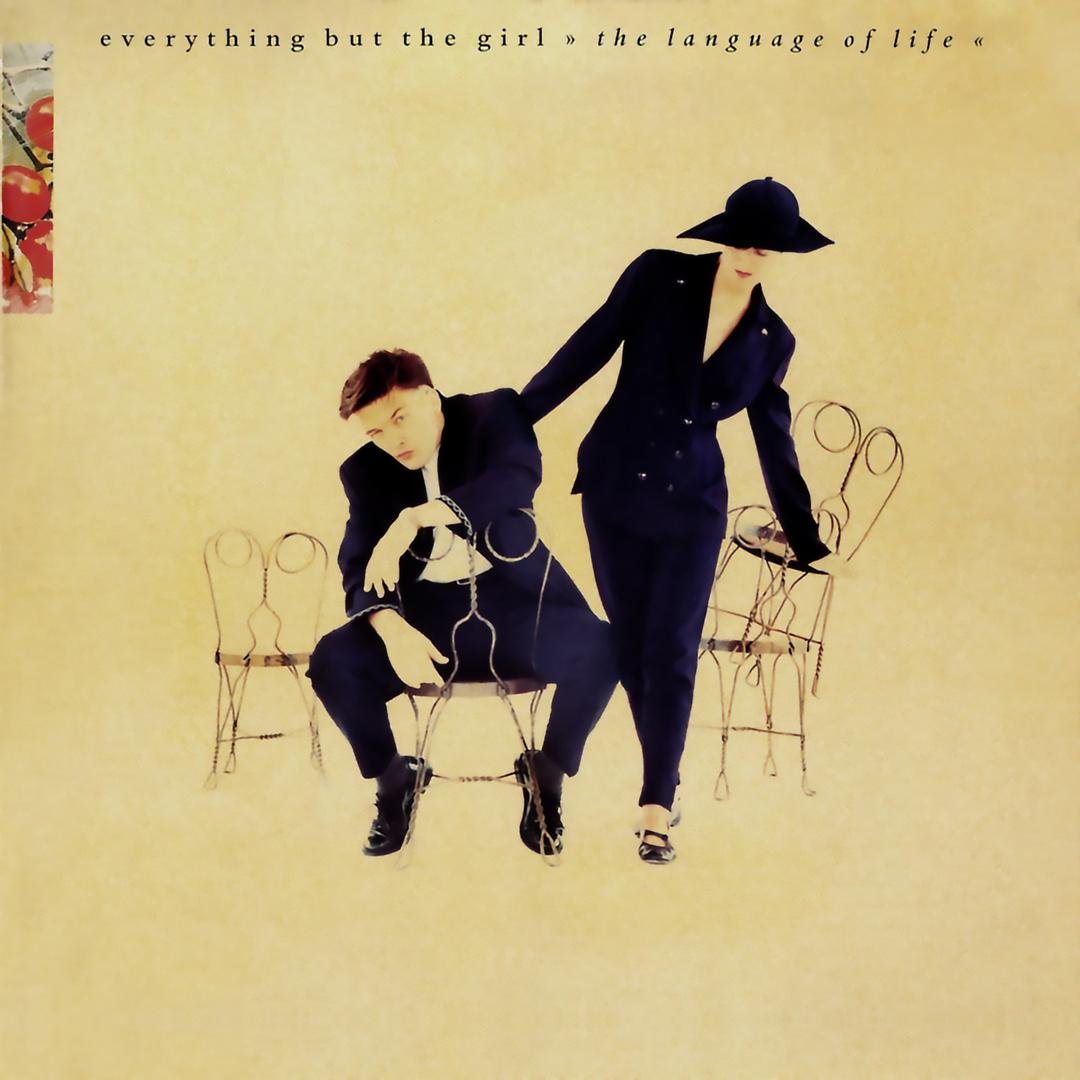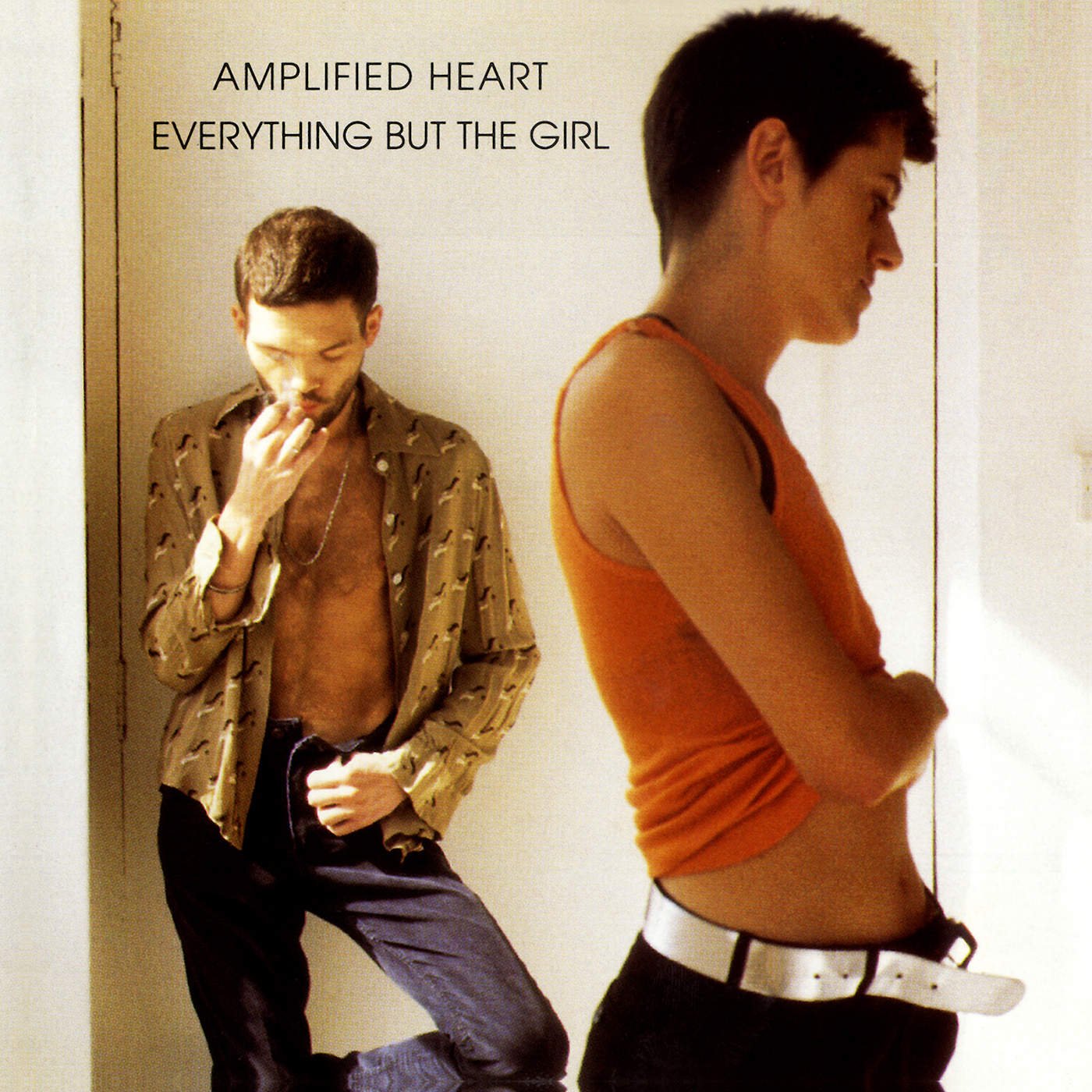Happy 25th Anniversary to Everything But The Girl’s tenth studio album Temperamental, originally released September 27, 1999.
So often, when I read about UK duo Everything But The Girl’s tenth studio LP Temperamental, Ben Watt and Tracey Thorn’s pulsing 1999 triumph is usually categorized as the sequel to their drum-n-bass and trip-hop drenched million-plus-seller Walking Wounded (1996) that was released three years earlier.
But I’ve always viewed Temperamental differently. To me, it was the thrilling first chapter of a promising new book—one that got shelved before the authors wrote anything further. The thumping and grooving dance album was an exciting excursion for the creatively curious but normally understated Watt and Thorn. It featured a collection of songs that could have catapulted Everything But The Girl onto a new path as leaders of moody and melodic dance club hits that incorporated stellar, memorable songwriting—had they not embarked upon the 24-year recording hiatus that thankfully concluded with the release of Fuse (2023) last year.
The making of Temperamental marked a new chapter of creative workflow for the romantically linked pair after Watt and Thorn became first-time parents of twin girls in 1998. So, it was the first album they made with a family in tow. Naturally, the two new additions to their bloodline forced changes in how Watt and Thorn were going to make music as a team.
Thorn was laser focused on raising the newborns. It was a personal pivot she welcomed after finding herself, during their massively successful Walking Wounded era a few years earlier, increasingly losing interest in the whole pop star thing. “We were in the middle of a career high point,” Thorn recalled about that time period in her 2013 memoir Bedsit Disco Queen, “and though I was excited about it all, I was beginning to feel a bit less involved, less entirely engaged, than I had for a while.”
That lagging interest in stardom coupled with her growing desire to finally start a family with Watt led Thorn to decide in 1997, at the height of their Walking Wounded success, that they would turn down U2’s offer to be an opening act on the American leg of the Irish band’s huge PopMart tour.
So, a year later, being a stay-at-home mum was exactly what Thorn wanted. “I was totally and utterly wrapped up in the world of babies,” she remembers in her memoir, “happy as a clam, content to slob around the house all day in baggy track pants, wander up to the shops with a pram and then settle down in front of afternoon telly while I fed them both.”
Because of this natural shift in Thorn’s life priorities, Temperamental became primarily a Watt driven creation. Although, as Thorn recounts in Bedsit Disco Queen, he was a devoted father to his new twin girls, Watt didn’t want to stop EBTG’s forward-moving momentum that started when Amplified Heart’s “Missing” became a late-blooming surprise hit around the globe in 1995, and then continued in 1996 when Walking Wounded became their best-selling album. So, he took it upon himself to begin creating a new collection of songs for the duo, even though he didn’t know if Thorn would be joining him in the venture.
Listen to the Album & Watch the Official Videos:
Watt began writing lyrics and composing more dance-oriented music (with minor assistance on beats and scratches from other collaborators) inspired by his late nights as a DJ in London’s percolating house music and drum-n-bass club scene. “After the making of Walking Wounded,” Watt explained in a 1999 interview, “I became more and more addicted to this kind of sound. I wanted to take that sound to a pop audience without losing sight of strong narrative songwriting and soulful singing.”
The duo’s melancholy electronica of Walking Wounded—with compositions mostly created by Watt—built on its 1994 folk-soul predecessor Amplified Heart’s penchant for lyrically mining his and Thorn’s interior personal revelations about love, life and self. But on Temperamental, Watt was now fully in charge of composing the duo’s music and more of their lyrics. And as his passion for the club scene increased over the past few years, so did the BPMs on what would become Temperamental, as his lyrical gaze turned a bit more outward into the city night where the beat pumps until late morning.
Eventually, Thorn wrote lyrics for a few songs including “Hatfield 1980” and “Downhill Racer,” and they recorded most of the album in their basement studio at home. “In the evenings, after the twins had fallen asleep in their cots, I would drag myself downstairs,” she wrote in Bedsit Disco Queen about the recording sessions, “set up the little winking baby monitor in the corner of the room and record the vocals, having to stop in time for the last feed of the night at around eleven.”
But Thorn’s emotional involvement in what she was singing, akin to her availability to record vocals, was somewhat limited. “I loved all the music Ben was creating, but I just wasn't in the right state of mind to contribute much of any value,” she revealed in her book, “and in a sense, I ended up being guest vocalist on someone else's album.”
I remember being surprised when I first read that passage in Bedsit, but it actually makes sense when you listen to Temperamental. This time around, Thorn wasn’t at the forefront as much as she had been on previous Everything But The Girl albums. The throbbing beats and late night vibe Watt created take center stage as house, drum-n-bass, and even light hip-hop soundscapes step into the spotlight first. For proof, just listen to the 48-second intro on the album’s opener “Five Fathoms,” the 78-second drum-n-bass intro to “Blame” and all 7 minutes and 11 seconds of the mid-album instrumental journey “Compression.” This album is Watt’s late night playground.
That’s not to say the songwriting lags or that Thorn turns in a boring performance—quite the opposite. As usual, she excels and shows range in the more densely packed music environment built by Watt. But, you can hear a tightness in her vocals and a slight emotional distance in many of the lyrics she’s singing—a modest change from her trademark up-close and soul-stirring vocal delivery on the duo’s past albums. Yes, it’s partly because of her desire to center her attention on child rearing instead of music. But, I also think it’s sometimes a result of singing lyrics about someone else’s experience that she may not have fully connected to.
On “Five Fathoms,” for example, Thorn’s take on Watt’s words turns our POV outward as she journeys us through late night London (“I walk the city late at night / Does everyone here do the same? / I want to be the things I see / Give every face and place my name”). The entire vibe of the album is revealed in the next lines, “Did I grow up just to stay home? / I’m not immune, I love this tune.” I’d imagine that those words were the exact opposite of how Thorn was living at the moment she recorded them.
For me, those lyrics set the tone for the entire Temperamental listening experience because that’s exactly how I was living during the time period in which this album came out. When Temperamental was released in September 1999, its lead single “Five Fathoms” had already reached the #1 spot on Billboard’s Dance Club Songs chart a week earlier. So, I remember hearing it in clubs that summer and I owned it on CD.
Enjoying this article? Click/tap on the album covers to explore more about Everything But The Girl:
I was thirty at the time, living in the Chelsea neighborhood of New York City, buying dance music remixes at Rebel Rebel in the West Village, and going out pretty much every weekend with my friends to dance clubs like Roxy, Twilo, Limelight, Body & Soul and, during that summer, the Pavilion club on Fire Island. Sometimes my Saturday nights would bleed into Sunday evenings and, admittedly a few times, into Monday mornings. That’s where this album brings me back to: decadent New York nightlife, dark dance clubs and celebrity DJs with last names like Rauhofer, Calderone, Vasquez, Fierman and Morabito.
So much of Temperamental—whether it’s in some of its lyrics about nightlife or all of its arrangements—captures the essence of overnights on the dance floor where bumpin’ to the music, cruising, and “calling down the spirits” (to quote a line from Malcolm McLaren’s 1989 club track “Deep in Vogue”) were ways to have fun, expand your consciousness and, sometimes, work through the troublesome battles inside your head.
Take the title track “Temperamental,” for instance. If you listen to its alternate Pull Timewarp Mix version on EBTG’s 2005 compilation Adapt or Die: Ten Years of Remixes, you can feel the heaviness of the song’s intention in Thorn’s delivery as she pushes through its sad lyrics (“You’re like an empty cup / But I can’t fill you up”) that peak with her defeated conclusion “I don’t want you to love me.” The depth of despair is hard to swim through at that moment.
The original album version, though, takes a different approach to the same love problem. It pumps through the emotional distress with a layered house beat that places Thorn on the dance floor as she steps up into her rarely used (but gorgeous) falsetto to open the song. She’s dancing it out, ruminating about another inevitable relationship failure that’s just around the corner as she shifts back down into her signature alto (“I don't get where you're coming from / What is real and what's put on / What has stayed and what has gone and / How long will this thing go on and on?”).
But while conflicting emotions bounce around in her head, she’s pulsing her body to Watt’s relentless beat, letting it cleanse her and open the way for some clarity as she locks into its circular groove to freely and repeatedly sing out “I don’t want you to love me” into the ether. Believe me, this is what happens on the floor when you’re dancing away your troubles: you surrender them to the spirit and lose yourself as the continual pulse keeps your body occupied.
The centerpiece of Temperamental—and, hands down, Watt’s best beat work and production on the album—is “Lullaby of Clubland.” I don’t think I’ve ever heard a better song about going out at night to sweat out a recent breakup on the dance floor (“How much of yourself do you give away / After someone’s left your life in disarray?”) and find someone to go home with to try and forget about it all (“Are you on your own? / I'm into you / When are you going home? / Get into me.”). Yes, Robyn’s “Dancing On My Own” tearjerker dance classic comes close, but she’s not singing about finding someone outside the club to get under as a way to get over like Thorn does in “Lullaby of Clubland.”
It’s an understatement when I say what a revelation it was to hear Thorn sing Watt’s lyrics about sex-as-sport in this way. It was new territory for both Brits to be sexually forward in an EBTG song—it’s the moment on the album where you can imagine their future as purveyors of dance music filled with deeply drawn, down-to-the-bone examinations of late night needs and the inner conflicts that drive those desires.
Like “Lullaby of Clubland”, every song on Temperamental has meat on its beat bones. Even the downtempo and more lyrically serious offerings still move the body. Yesterday, I was walking down Sunset Boulevard in Echo Park here in L.A. listening to Temperamental in my headphones (I often walk to an album when I’m in the middle of writing about it). As I was browsing through records while listening to it at the local record shop, I kept catching myself lightly bouncing through the slower, slightly hip-hop tracks like “Hatfield 1980,” “Downhill Racer,” and “Low Tide of the Night.” Where the compositions on Walking Wounded surround you in their electronic warmth and drum-n-bass skittering, the tracks on Temperamental move your core ‘til you find yourself bobbin’ your head in a record shop.
Even with the inclusion at the end of the album of the shimmering and swirling “The Future of the Future (Stay Gold)”—EBTG’s delicious collaboration with electronic music stars Deep Dish, which was a previous #1 club hit from the Washington D.C. based DJ-production duo’s 1998 album Junk Science—Temperamental didn’t fare as well on the charts as Walking Wounded did. In the UK, Temperamental peaked at #16; in the U.S. it rose to #65 and at the end of 1999 only sold around 115,000 copies in the states. That may have been due to Napster’s emergence four months earlier, which made an immediate dent in everyone’s album sales and eventually rewired the music industry.
Or, the lower sales figures might have been partly because of Thorn’s aversion to doing much promo for the album, leaving Watt to handle all of the U.S. interviews himself as he worked hard to internationally promote the release. As Thorn recalled in her memoir, “He was spending hours on the phone to journalists in every corner of the world, doing phone interviews for every music paper that now wanted to talk to us, just when I'd decided I no longer wanted to talk to them.”
The touring for Temperamental was also limited due to the expansion of their family and Thorn’s waning interest in the project in general, as she recounted in her book,” I was feeling guilty, and committed to a project that really my heart wasn't in, but I couldn't pull out and leave Ben in the lurch, so I tried, half-heartedly, to carry on. It wasn't my finest moment.”
After a few attempts to tour with their twins along for the ride, Watt and Thorn ended up shelving future promotional treks for the album and played a few music festivals instead, with Switzerland’s Montreux Jazz Festival in the summer of 2000 being their final Everything But The Girl show. The day after their set, Thorn felt sick. Eight months later their son Blake was born.
Soon after, Watt and Thorn laid recording new music as a duo to rest. "To be honest, it was never easy," recalled Watt in a 2010 Guardian interview about their career together. "When you throw kids and family into it, something has to give. You can't keep all that going at the same time. You'd go mad."
Although the reasons for shelving Everything But The Girl at the time are totally understandable, Temperamental left us with an unanswered question: could Watt and Thorn have kept in motion a new creative dynamic, where Watt spearheads the creation of dance-oriented music and lyrics while Thorn takes on a vocalist role? Could they have ended up making several more popular and emotionally resonant dance albums that listeners would continually return to years after they were released?
For nearly a quarter-century following Temperamental’s arrival, that didn’t happen. Perhaps that’s why Temperamental continues to hold such a sentimental place in the hearts of EBTG’s fans. The immensely satisfying dance album gave us a taste of what the duo’s future could have been during that period until they unexpectedly rewarded our patience with the stunning return-to-form Fuse in 2023.
LISTEN:
Editor's note: this anniversary tribute was originally published in 2019 and has since been edited for accuracy and timeliness.





